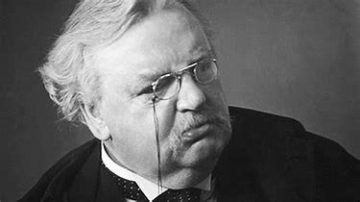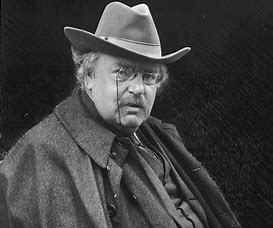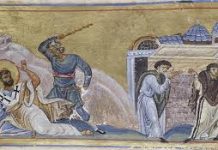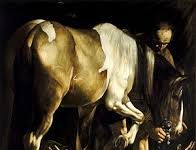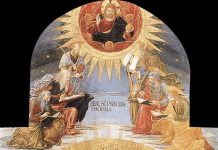G.K. Chesterton (1874-1936) hardly needs an introduction to the typical reader of Catholic literature. Author of more than sixty books of essays, fiction, poetry, biography and drama, Chesterton’s hundreds of essays are sprinkled among scores of books. This fact presents a problem of difficult accessibility, remedied at last by an intelligent collection of the best of G.K.’s short and eminently readable essays, sixty-seven altogether, into one volume of nearly four hundred pages. In Defense of Sanity (edited by Chesterton scholars Dale Ahlquist, Joseph Pearce, and Aidan Mackey) is a masterpiece anthology that surely would have pleased Chesterton. Pearce notes, in his preface to the book, that Chesterton was, and remains, “one of the finest essayists ever to grace the English language.” And as Ahlquist suggests in the book’s introduction, anyone in search of the perfect essay by G.K. might very well start with “The Twelve Men.”
The Twelve Men
This essay of barely four pages, originally published in a 1909 volume titled Tremendous Trifles, concerns the jury system of England and why it exists as it does. Chesterton speaks of himself as recruited to serve on the jury of twelve because his surname begins with a C, along with the names of all the other jurors in Battersea alphabetically chosen for that trial. The character of the person on trial and the crime for which he is held Chesterton does not mention. He is more concerned to comment on the reason for twelve random jurors rather than persons who specializes in jury duty. The specialist, Chesterton reasons, can hardly be counted upon to be the one most reliable and objective witness to the evidence presented in a case. It should be remembered that the policeman, the prosecutor, and the judge are all specialists. It is for this very reason they cannot be trusted; they have a dog in the fight. This is, Chesterton reminds us, a paradox: that the people who know the most about the law ought least to be trusted to administer it, except in the special roles they play … which most certainly do not qualify them to judge all the evidence presented for and against the defendant. But twelve people who do not know the defendant can in fact be trusted, more likely than not, to be objective at least most of the time.
The jury system is, of course, a Christian system. It relies upon fair play and the search for truth, which is a very Christian standard. It also relies upon twelve judgments, which allows a jury to be self-correcting because all do not think alike. Indeed, there is likely to be at least one juror who, if collective error seems to be in the wind, can in the course of discussing the evidence turn the others toward the right path of reasoning (one thinks of Reginald Rose’s Twelve Angry Men, for example). The specialist (especially the policeman and the prosecutor) gets used to his evidence and his judgment. Practicing law becomes routine and at times hum-drum. The specialist may have automatic reflexes that may interfere with good and sound judgment. What the Court does when it selects a jury of twelve is to bring in fresh faces who can see the forest because they are not too close to the trees. So when the Court selects a jury, Chesterton reflects (now comes the surprise ending) “it collects twelve of the ordinary men standing around. The same thing was done, if I remember right, by the Founder of Christianity.”
Woman
The essay “Woman” was originally published in a collection titled All Things Considered (1908). Here Chesterton is at his paradoxical best. A paradox will be regarded as somehow true even when it seems to be false. Since the liberation of women from the drudgery of their lives was very much a theme of interest in Chesterton’s day, the principle concern of men and women was how to make that possible. Women, Chesterton notes, are always worried about something; at present mostly they are worried about their housekeeping and their children and their husbands. “And I suppose if we strangled the children and pole-axed the husbands it would leave women free for higher culture. That is, it would leave them free to begin to worry about that. For women would worry about higher culture as much as they worry about everything else.” But what is forgotten in all this discussion of women’s drudgery is the fact that, except for the comfortable upper classes, most men are also subject to chronic and debilitating drudgery. “… the ordinary man who typifies and constitutes the millions that make up our civilization is no more free for the higher culture than his wife is. Indeed, he is not so free. Of the two sexes the woman is in the more powerful position. For the average woman is at the head of something with which she can do as she likes; the average man has to obey orders and do nothing else. He has to put one dull brick on another dull brick, and do nothing else; he has to add one dull figure to another dull figure, and do nothing else.”
Is this not a paradox? The man is a slave in his business and the woman both master and mistress in her household. Who needs to be liberated? The man cannot place several bricks artistically for effect, lest the whole building collapse; but the woman, summoning all the wildness of her imagination, can build up a stew that has the whole family pleading “More, please!” The man cannot choose what time he will be home from work, but the woman can choose what he will have for dinner. Chesterton presses home his point: “The average woman is a despot; the average man is a serf.” What the average woman may find, when she reaches her higher culture at last, is that she will become more servile than men ever were; while the average man, if her disposable income is great enough, may well become her tool and hanger-on. Had Chesterton lived into our own time, he would surely have been able to connect the dots with increasingly clever conviction.
On the Instability of the State
This essay is from Avowals and Denials (1934). In it Chesterton considers the confusing news coming out of Germany by way of a seemingly confused international media. On the one hand, Hitler is supposed to be an advocate for families, and the larger the better; on the other hand, Hitler is is said to be all for the iron law of eugenics, which is about as contrary to family freedom as anything can be. These two contradictory bits of news raise the question of whether the news can be believed at all; the very source of both views is now in doubt, it being an axiom of real truth-seekers that contradictory statements cannot both be true. All this confusion, Chesterton believed, began about a hundred years earlier, when it started to become fashionable to oust the traditional primacy of the Family over the State, and by reversing that primacy, to grant the State superabundant powers of control in the matter of creating superabundant Utopias (spectacularly reflected in the State’s control over traffic and telephone systems). Unfortunately, Chesterton avows, the superabundant Utopias, supposed to be so well organized as to put the Family to shame, were in fact organized more like lunatic asylums or prison camps (apparently Chesterton saw the Nazi madness long before it fully registered with everyone else). Were Chesterton living today, he might well subscribe to the view that at last the lunatics have taken over the asylum and in their own peculiar ways have put us all under their lunatic heel.
This notion, that the State is rightfully mightier than the Family, has been reinforced by the dissolution of the Family through divorce and economic hard times. The State grows increasingly powerful as it administers more and more to the needs of the broken Family. But this phenomenon is illusory. Religion always taught that the Family is more important than the State, and that it is the final bulwark of protection against the tyrannizing tendencies of the latter. Indeed, look at what happened in Nazi Germany and what is happening even now throughout the world. Against the topsy-turvy chaos of big cities and big governments the modern Family remains in a state of broken passivity. Will that be a permanent condition of all states everywhere and forever? If the chain of downward spiral is to be broken for modern man, Chesterton insists, “He must, in fact, fall back on that primal and prehistoric institution; the fact that he has a mate and they have a child; and the three must get on together somehow, under whatever law or lawlessness they are supposed to be living…. The Family will stand out stark and strong as it did before the beginning of history; the only thing that can really remain a loyalty, because it is also a liberty.”
The Revival of Philosophy – Why?
Here Chesterton explains why philosophy is so important: “The best reason for a revival in philosophy is that unless a man has a philosophy certain horrible things will happen to him.” Then follows a litany of those horrible things … from being too practical to being too progressive. Absent a well thought philosophy, and “Thus struck down by blow after blow of blind stupidity, he will stagger on to a miserable death with no comfort but a series of catchwords.” And where will these catchwords come from? They are those bits and scraps of somebody else’s philosophy which are inane and less reliable than the instincts a brute beast in a jungle possesses to guide it “practically” through life.
Take the case of the so-called practical man who is called in to correct a social crisis or entanglement. He sets to work immediately, but if he is a practical man without a clear philosophy in his own head, he is as likely as not to make the crisis or entanglement worse than ever. The world is full of such well meaning, muddle-headed practitioners of the practical. The practical person without the right philosophy, or with barely any philosophy at all, can in many instances be a menace to civilization itself even if, as may well be the case, he makes a few millions for himself along the way. Consider the inventors of chemical warfare. Did it occur to any of them that this more practical and efficient way to kill might be turned against those who were first willing to use it? Rather, would the learning of a certain noble philosophy, that we should not do unto others what we would not have them do unto us, have been a more “practical” philosophy than to kill, kill, kill? And so, Chesterton concludes, “What we need, as the ancients understood, is not a politician who is a business man, but a king who is a philosopher.”
On Original Sin
This essay is from a 1930 volume titled Come to Think of It. Chesterton begins by observing that the science fiction novelist H.G. Wells adamantly asserted the incredibility of the doctrine of original sin. If there was one orthodox doctrine above all others he could without reservation reject, that was the one. On a scientific basis, the doctrine was simply without merit. (We should keep in mind that Well’s expertise was not science, but rather science fiction.) Yet, interestingly, Chesterton notes, the novelist Aldous Huxley, something of an unbeliever himself, just as confidently asserts original sin to be the one orthodox doctrine that is most believable. How is a Catholic apologist to reconcile such opposing views? One might begin by pointing out that Original Sin has to do with origins, and that therefore the subject is, from an anthropological point of view, as legitimate a matter to consider as Darwin’s views on evolution in The Origin of Species.
Chesterton regarded the scientist’s dismissal of original sin as unwarranted for a very good reason: sin is not a subject with which science is competent to deal, since it resides in the human spirit, and that spirit is unique in a way that the “spirits” of other ancient creatures are not. “The elephant does not turn up his long nose at everything with any superior intention … and the giraffe might be called a highbrow, but he is not really supercilious about his powers of uplift … and there may be no more reason to accuse the peacock of pride than to accuse the pelican of charity.” In short, Chesterton concludes, there is no other creature who sins, nor any other creature who can be a saint. So if sin is uniquely human, the inference is reasonable that at some point the first sin was committed. If there is any sin that is uniquely human, it is pride. And therefore it is entirely reasonable that the original sin was rooted in self worship. That sin has certainly been the trunk from which all the great sins have branched out in a way other creatures could not have branched them out. The old religion had it right. Adam and Eve fell before the greatest temptation of them all … the delicious fruit of a tree and that cynical nudge of the serpent, “God knows well that when you eat of it your eyes will be opened and you will be like gods, who know good and evil.”
The Drift from Domesticity
Chesterton begins this essay by asking us to imagine a gate or fence that has existed in a certain place from time immemorial. Someone comes along and says, “I don’t see the use of it. Let’s tear it down.” Someone else comes along and says, “You shall not tear it down until you see the use of it, and can justify the tearing down of it.” Imagine now that this fence or wall is the mighty fence or wall called the Catholic Church. Someone says, “I don’t see the use of it, let’s tear it down.” Someone else says, “Think harder. See if you can see the use of something built two thousand years ago that is still standing as a bulwark to invading hordes of barbarians.” There are those anarchists who think the same way about the institution called Family. They do not see why it ever arose, they do not see the need of it, and even promote its abolition for the same feeble reason. In one respect, at least, they have many champions on their side, given the number of modern divorces. But still, the question remains: why did the Family come to be if it served no useful purpose? And why does it persist even now despite the many and violent attacks upon it?
The illogical nature of this drift from domesticity is easily demonstrated by reversing the terms. If it is the spirit of the age that children, upon reaching the age of fifteen, should rebel against their parents and dismiss them as doddering fools, why is it not as right for parents to dismiss their infant children as drooling idiots and abandon them without delay? Again, the admonition is warranted: think harder! Is anarchy not, in the end, self-defeating? Ah, but the progressives will insist that the rearing of the young can be done by a state-run bureaucracy, and with greater efficiency, allowing one teacher per hundred children. Who, Chesterton asks, will train and pay for this bureaucracy? And why are these bureaucrats more efficient than the unpaid mother who tends to just several of her own children with decidedly more interest than a bureaucrat can muster? The notion that bureaucrats will cultivate culture-loving children is disputed by the observation of what happens inside a classroom when the teacher leaves the room.
As Chesterton remarks: “My complaint of the anti-domestic drift is that it is unintelligent. People do not know what they are doing; because they do not know what they are undoing…. The family, especially in the modern state, stands in need of considerable correction and reconstruction ; most things do in the modern state. But the family mansion should be preserved or destroyed or rebuilt; it should not be allowed to fall to pieces brick by brick because nobody has any historic sense of the object of bricklaying.”
The Rout of Reason
In this essay from Where Are the Dead? (1928) Chesterton contested the modern drift toward agnosticism; not just those nagging doubts about whether God exists, but the chronic habit of doubting nearly everything else as well. “I am especially wondering what has become of the human power of reasoning in this age,” Chesterton muses. It is fashionable, for example, to doubt that mind exists because you cannot draw it on a chalkboard. But, Chesterton retorts, “we cannot even perceive matter except by mind.” Even that venerable agnostic T.H. Huxley, in the days when agnostics could still think, “said that if he had to choose between denying mind or matter, he would deny matter.” Moreover, any person with a brain could deduce that to deny a man is dead when he is clearly dead is not the same as to deny that his soul died with him. This doubt about the immortality of the soul is on a par with the doubt about Transubstantiation. When a bishop recently suggested that doubts about the Transubstantiation could be set to rest by chemical analysis, he was clearly demonstrating not only the collapse of his faith, but as well the collapse of his reason.
The agnostic who denies the rationality of the doctrine of Transubstantiation can be excused for his denial. He might well be the same person who denies that Christ had risen from the dead. But to say it is rational to deny what Catholics have not even claimed to be accessible by the senses, namely the divinity of Christ under the appearance of bread and wine, is hardly fair. This kind of denial is of the same order as denying that the universe once did not exist and then was created. How would you be able to prove the contrary, that it always existed? On the other hand, science today has discovered a great mystery: namely that the universe once did not exist and suddenly, for no explicable scientific reason, appeared with a Bang. Science does not deny the event, even though it may stagger both reason and imagination to envision it. Why then must the agnostic suppose that, for all intents and purposes, the bread and wine must remain mere bread and wine because we cannot see with our eyes the Body and the Blood?
If I Only Had One Sermon to Preach
The first sentence of this essay is: “If I had only one sermon to preach, it would be a sermon against Pride.” And here is the paradox, according to Chesterton: though almost universally recognized as the single great mortal sin (even Plato, Aristotle, and the ancient Greek dramatists thought so) it is the very sin that most people shun to recognize in themselves. And why would they if they are guilty of it? It stands to reason that almost everybody is in need of a sermon on the worst of the Seven Deadly Sins, since everybody is practicing it. While we may forgive with gentle feelings, and even a sense of humor, the lesser faults of others, we cannot abide the great fault when it is most obvious. In any English pub the familiar fighting phrase shouted over a glass of ale can be heard: “’E comes in ‘ere and ‘e thinks ‘e’s Gawd Almighty.” But any observer of this event can justly conclude, as Chesterton does: “The man in the pub has precisely repeated, word for word, the theological formula about Satan.”
What Chesterton and many others have noticed is that the 20th century is the great century of ego isolation and satisfaction; the century in which a house of mirrors dominates everywhere so that egotists can applaud their own vanity; a century in which the new and prideful science of psychology can bring itself to talk about all kinds of neuroses except pride, which is the root of all mental instability and disease; for as any old country priest could tell you, pride is from hell.
And so, Chesterton concludes, “I should begin my sermon by telling people not to enjoy themselves. I should tell them to enjoy dances, and theaters and joy-rides and champagne and oysters; to enjoy jazz and cocktails and night clubs if they can enjoy nothing better; to enjoy bigamy and burglary and any crime in the calendar, in preference to this other alternative; but never to enjoy themselves…. If I had only one sermon to preach, I certainly could not end it in honor, without testifying to what is in my knowledge the salt and preservative of all these things. This is but one of a thousand things in which I have found the Catholic Church to be right, when the whole world is perpetually tending to be wrong; and without its witness, I believe that this secret, at once a sanity and a subtlety, would be almost entirely forgotten among men…. If I had only one sermon to preach, I should feel specially confident that I should not be asked to preach another.”
Post Script
Recently the sainthood cause of Chesterton was put on hold by Bishop Peter Doyle. He gives three reasons: (1) there is no local cult for Chesterton; (2) there is no detectable pattern of personal spirituality; (3) the issue of Chesterton’s anti-semitism is a real problem. As to the first objection, it seems to me that the well-known and documented universal cult of Chesterton’s followers would more than make up for the lack of a local Chesterton Club. As to the second objection, powerful personal spirituality in Chesterton can certainly be detected merely by reading The Everlasting Man or any number of Chesterton’s religious poems. Moreover, a considerable number of converts were helped along (including myself) through Chesterton’s writings, which ought to remind us of the Epistle of James 5: 19-22. “My brothers, if anyone among you wanders from the truth and someone brings him back, let him know that whoever brings back a sinner from his wandering will save his soul from death and will cover a multitude of sins.” As to the third objection, let Chesterton defend himself, as he does in his autobiography: “I lived to have later on the name of an Anti-Semite; whereas from my first days at school I very largely had the name of Pro-Semite…. I have not really ended any differently from the way in which I began. I held by instinct then, and I hold by knowledge now, that the right way is to be interested in Jews as Jews: and then to bring into greater prominence the very much neglected Jewish virtues, which are the complement and sometimes even the cause of what the world feels to be the Jewish faults.”
If Chesterton had serious faults, I should think the most obvious of them would be his ravenous appetite for pudding cake and paradox, hardly disqualifying grounds for sainthood.
